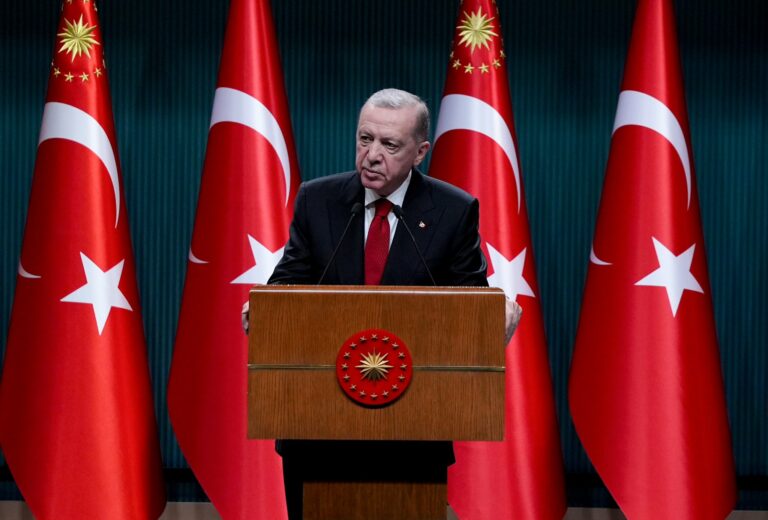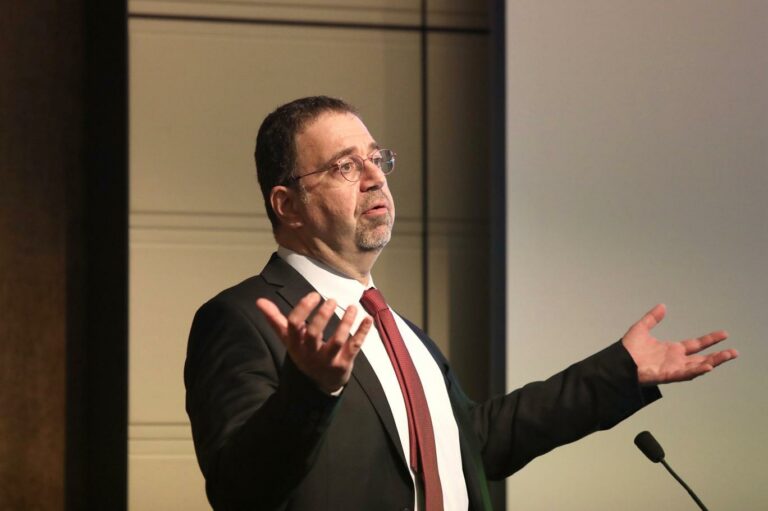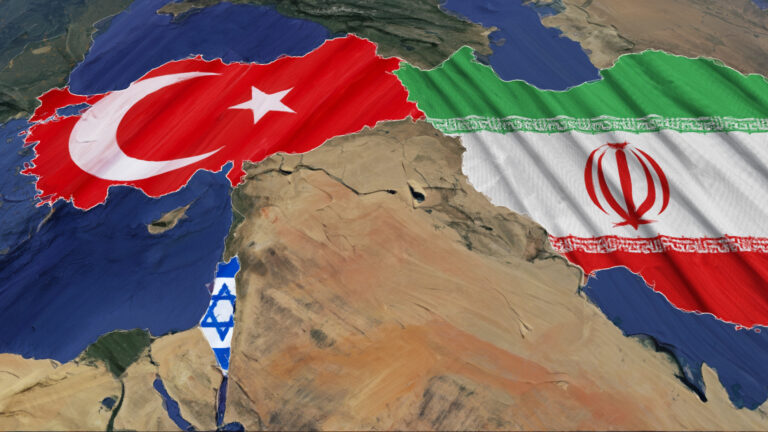by Leo Kendrick
President Recep Tayyip Erdoğan announced a series of measures in a speech following a cabinet meeting on Monday evening, aimed at strengthening the Turkish Lira against foreign currencies such as the US Dollar and Euro, following weeks of record devaluation of the country’s currency, soaring inflation, and skyrocketing prices driven in large part by the lowering of interest rates by Turkey’s central bank. Lowering of interest rates has become a hallmark of President Erdoğan’s economic policy, but he has come under fire of late as these policies have driven the Lira’s crippling devaluation. Monday evening’s emergency measures came after the Lira reached a record 18.3 to the Dollar earlier that day.

Under the new emergency measures announced by President Erdoğan, citizens who deposit Turkish Lira funds into a deposit account (mevduat) will be protected against any losses on returns due to exchange rate fluctuation. In the event of a loss, citizens will be compensated the difference. The President’s announcement resulted in rapid gains for the Lira, with its exchange rate against the Dollar going from 18.3 to 12.3 in a matter of hours. According to an announcement by the Turkish Bank Union, 1 billion US Dollars were sold in the hours following Erdoğan’s speech. The announcement also mentioned that potential losses will be covered by the Turkish treasury. In the days since the president’s announcement, many conversations amongst economists, analysts, and experts have focused on the longer-term effects of the measures announced, which while providing short term relief for Turkey’s currency, present risks long term.
The Lira’s rapid slide to 18 against the Dollar prior to the announcement of new measures had been fueled in part by a speech by the President earlier in the week citing Islam as the reason for keeping interest rates low. Interest rates, considered haram, or forbidden in the name of Islam, have been lowered progressively in recent months by Turkey’s Central Bank. The Lira has devalued in near lockstep with these interest rate drops. President Erdoğan was quoted saying “As a Muslim, I will continue doing what our religion tells us. This is the command.” In a segment earlier this week, Medyascope’s Ruşen Çakır commented on the president’s use of Islam as a tool for economic policy. Referencing the president’s professed desire to continue lowering interest rates in the name of Islam, Çakır questioned why in his 20 years in power, Erdoğan has not previously sought to lower interest rates for this reason, despite the limitations he has imposed on other haram activities in Turkey such as alcohol conumption and gambling. Çakır mentioned also the deleterious effects Erdoğan’s use of Islam for economic purposes could have on religion in Turkey, saying “This case has nothing to do with religion. This is a case of a politician who is unable to perform his job properly harnessing religion as an economic tool…Erdoğan is actually doing a disservice to Islam because Islam is not the source of this economic harm. Instead we see a politician with no chance of succeeding using Islam as a source of legitimazation to promote failed economic policies [low interest rates].”
Despite being center-stage in recent economic debates surrounding low interest rates, Islam is not the president’s only rationale for his economic policies. Erdogan’s economic approach is guided by a belief that a cheaper Lira will lead to higher exportation, which will in turn lower inflation naturally. The president has previously promised to lower inflation to below 4%, one that he has never been able to follow through on. Orthodox economic advice has cautioned that high interest rates are necessary to prevent runaway inflation, an approach the president takes issue with both in the name of Islam and because of a desire to post high export and growth numbers.

On Wednesday, Medyascope interviewed economist Selçuk Geçer regarding the longer-term effects of the economic measures announced. Geçer characterized the measures as ‘not extraordinary’ and similar to packets announced during economic crises in the 1970s and 1990s. While such economic emergency measures offer short-term relief, Geçer said, past experiences with similar policies have shown that the government may be forced to lift these measures shortly, as they present enormous risk long-term.
After the rapid gains against the Dollar following Erdoğan’s speech, many expected the Lira to rapidly lose value once again. Instead, it settled at just under 13 to the USD. Some analysts and Erdoğan loyalists attributed this to the fact that the measures announced by the president had been convincing. Geçer disputed this interpretation, saying the changes simply made business in Turkey possible again: “How did it drop from 18 to 12? This had been a very shallow market in which it had been nearly impossible for anyone to do business.” Asked whether the new economic measures would be sustainable, Geçer cautioned that the new inflation numbers, set to be announced 3 January, will likely be very high and cause unease in the market. Additionally, Geçer said that although the Monday’s new measures resulted in a drop in exchange rate against the Dollar and Euro, “Bread prices continue to be sky-high, car and house prices are still high, grocery items such as milk and meat are still high…This success story does not reflect in our real lives.” While many supporters of the president offered the Lira’s recovery this week of the “safety and security” offered by Erdoğan’s regime, Geçer countered this interpretation, saying “In an economic environment in which the currency is fluctuating from 12 to 18 and back to 12 in a matter of weeks or even hours you cannot convince anyone of this ‘safety and security'”.
In another recent interview on the topic, Murat Sağman, an economist from Sagam Strateji Consultancy Firm, told Medyascope that the new economic measures are best thought of as short-term: “This appears at the moment to be a short-term solution, whether it will hold long term we do not know…I expect demand for short-term 3-month deposits to be high, while 6- and 12- month ones will be much lower”. Sağman described the new arrangement in which Turkish citizens will go to the bank and have three accounts: one in TL, one in foreign currency, and a third account in TL to protect against any losses in foreign currency. Commenting on the massive sell-off of dollars seen in the aftermath of Monday’s announcement, Sağman said “These measures will certainly lower the demand for foreign currency because you will be protected against exchange rate changes while benefiting from interest on deposits.” Although he believes that the foreign exchange rate has been calmed for at least a few months, Sağman mentioned that the treasury has entered a risky game by covering potential losses as the Turkish Lira is almost certain to lose value long term: “But I’d like to be clear, these measures offer short term stability; this is not a cure for long-term inflation.”
Dr. Kamil Yılmaz, a faculty member at Koç University’s economics department, was interviewed Tuesday by Medyascope‘s Edgar Şar on the new economic measures. While expressing relief that the government had imposed emergency measures, Yılmaz said the short-term relief provided also presents massive medium and long-term risk. He highlighted that as an import-dependent country, fluctuations in foreign exchange rate have a massive and direct effect on product prices in Turkey domestically. Yilmaz also mentioned that the potential losses to be covered by the Turkish Treasury under the new plan would be a long-term expense: “We know that the potential costs brought by this plan could be in the billions of dollars, and that this is an expense that will be paid for years to come, in Dollars.” Pointing to approaching elections as a reason for Erdoğan’s government to shore up economic support, Yılmaz said “There is a single explanation for this: we will have an early election and the measures announced on Monday will serve to protect the economy until that time.”
Following the gains seen by the Lira Monday evening and into Tuesday, Medyascope’s Ruşen Çakır released another Turkish-language segment entitled “Did Erdoğan turn out to be right?” The title of the segment referenced a tweet made by Osman Nuri Kabaktepe, head of the Istanbul branch of President Erdoğan’s Justice and Development Party (AKP). Kabaktepe’s tweet read “Come on, admit it. He turned out to be right again, no?” characterizing the president’s new economic measures as yet another success story after the Lira gained 30% against the dollar Monday evening. Çakır examined the way that the short-term fixes announced by Erdoğan in his speech will be marketed as major victories, crucial to electoral success. “The strangest thing is that Erdogan and his supporters will be able to take the thing that is going the worst right now– the economy– and use it as propaganda.” Echoing Selçuk Geçer’s analysis, Çakır commented on how Erdoğan has reverted to failed emergency economic measures used during the Turgut Özal era of the 1990s: “The fact that this government has been able to harness an economic practice used out of desperation during the Ozal years and claim it as a show of strength can be considered a success.” If there is success to be found in the new measures, he argued, it is in the form of electoral victory due to short-term economic relief, not in the form of true, lasting economic change and stability.
Medyascope'un haftalık e-bülteni
Andaç'a abone olun
Editörlerimizin derlediği öngörüler, analizler, Türkiye’yi ve dünyayı şekillendiren haberler, Medyascope’un e-bülteni Andaç‘la her çarşamba mail kutunuzda.
While Monday’s speech and the subsequent rebound of Turkey’s floundering currency stoked rumors of an imminent snap election in which the AKP may benefit off of the short-term economic relief, President Erdoğan held firm in his refusal to hold early elections, a demand voiced regularly by opposition politicians in recent months: “There will be no early elections…Period.”













